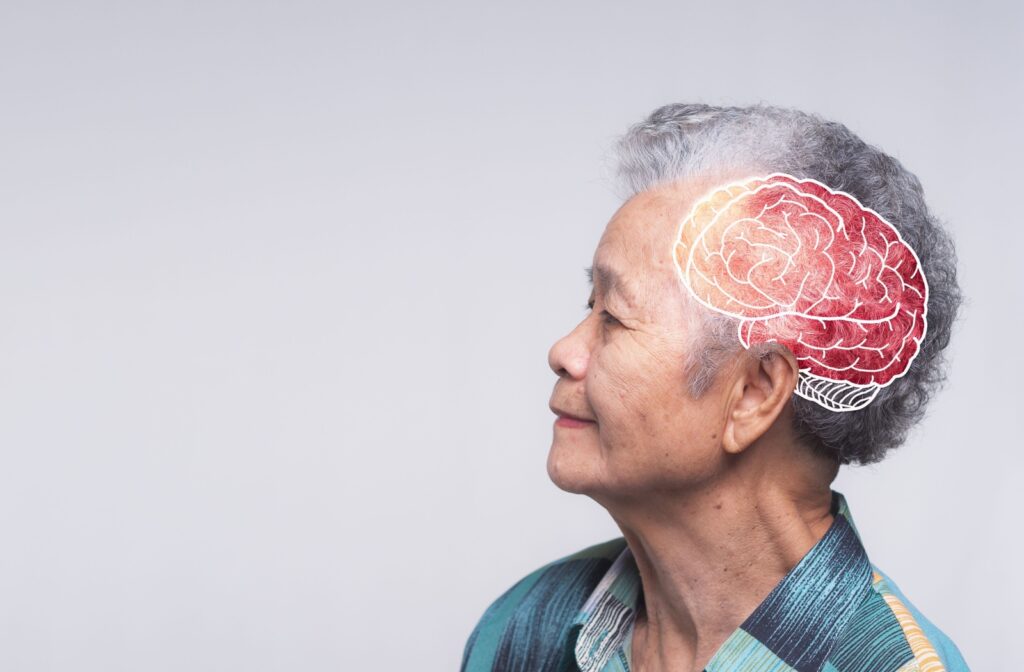Dementia is a condition that many older adults and their loved ones are concerned about. It can be challenging to live with, affecting both the person with the disease and their family and friends. Dementia is also progressive, which means support needs will increase as time goes on.
Dementia typically affects older adults over the age of 65, but in some circumstances, it can start earlier. If you’re concerned about dementia in yourself or a loved one, take some time to learn how to spot early signs and symptoms. An early diagnosis can mean more time to plan for the future, such as making financial arrangements or exploring options for memory care.
What Dementia Is
Dementia isn’t a specific condition, but a term that refers to a collection of symptoms that have to do with thinking, memory, and behavior. It’s not a normal part of aging, and there are multiple forms of dementia, including Alzheimer’s disease, vascular dementia, and Lewy body dementia.
Signs and symptoms of dementia include memory loss, wandering, trouble with language and conversation, mobility and balance issues, and lack of interest in hobbies and interests. While most types of dementia are incurable, there are treatment options available to address symptoms. These include medications and therapies.
Age of Dementia Onset
Typically, dementia occurs in those past the age of 65. On occasion, individuals may develop dementia at an earlier age. Early-onset dementia can appear before the age of 65. This kind of dementia may be diagnosed in a person’s 50s, 40s, or even 30s. How fast early-onset dementia progresses can vary, and scientists believe there’s a genetic component to developing the disease.
Frontotemporal degeneration and Huntington’s disease are more common among early-onset dementia patients, but the causes of dementia in both older and younger people are similar. Risk factors for developing early-onset dementia include a history of cardiovascular disease, social isolation, gene mutations, substance use, and even impaired hearing.
Childhood dementia refers to genetic brain disorders that cause dementia-like symptoms in children. It’s very rare, affecting around 1 in 2,900 live births.
Different Types of Dementia
The symptoms of dementia can be caused by a variety of conditions. The most common cause is Alzheimer’s disease.
Alzheimer’s Disease
Alzheimer’s disease impacts over 6 million Americans. It affects parts of the brain responsible for memory first, but as it progresses, language skills, reasoning, and behavior will also be affected. People with Alzheimer’s tend to have a build-up of proteins called amyloid plaques and tau tangles in their brains.

Vascular Dementia
A person may have vascular dementia if they have problems related to the flow of blood and oxygen in the brain. Strokes can cause problems with blood flow, but not everyone who experiences a stroke will develop dementia. MRIs can usually pick up brain abnormalities in people with vascular dementia.
Lewy Body Dementia
Lewy body dementia is a disease associated with deposits called Lewy bodies. These are irregular deposits of a protein called alpha-synuclein. In people with Lewy body dementia, these deposits can lead to problems in the cerebral cortex, hippocampus, and other parts of the brain.
Frontotemporal Dementia
This type of dementia primarily impacts the frontal and temporal lobes, regions of the brain responsible for planning, regulating behavior, language, and memory. A brain with a frontotemporal disorder may have atrophied frontal and temporal lobes. Frontotemporal dementia can affect younger people, and 60% of those who are diagnosed are between the ages of 45 and 64.
Recognizing Dementia Signs & Symptoms
While most forms of dementia have no cure, there are ways to manage their symptoms. Knowing how to recognize early signs and symptoms of dementia can also help with earlier diagnosis and planning.
If you’re concerned about dementia, watch out for the following early warning symptoms:
- Memory issues: Everyone forgets things from time to time, but pervasive memory loss is an early signal of something wrong. While forgetting what day it is can be normal, not knowing the time of year is more concerning.
- Mood changes: Depression and anxiety may be a sign of early dementia. People may be more upset by change, or they may lose interest in activities they once enjoyed.
- Problems with language and communication: People with early dementia may have trouble coming up with the right word. They may also have trouble carrying a conversation and may find themselves stopping in the middle of a sentence.
- Trouble with tasks: Procedures and tasks may be difficult to complete for someone with early dementia. This includes paying bills on time, following instructions, or remembering the rules of a game.
- Disorientation: A person with early dementia may have trouble finding their way home or following directions. Another early symptom is not being able to follow the storyline in a TV program.
Be sure to talk to a doctor if you notice signs or symptoms of dementia in yourself or a loved one.
Considering Memory Care
While people in earlier stages of dementia may be able to take care of themselves or have family and friends support them, dementia is a progressive disease that gets worse over time. As symptoms get more pronounced, more support may be needed. Memory care is often a suitable option for people living with dementia. Memory care programs can help alleviate family worries about safety, and can ease the burden on family caregivers.
Staffed by registered nurses and trained caregivers 24/7, Cedar Creek Senior Living offers memory care in East Bethel that provides services like meals, medication management, housekeeping, and recreational activities. To learn more about our accommodations and services, get in touch and schedule a tour today.



